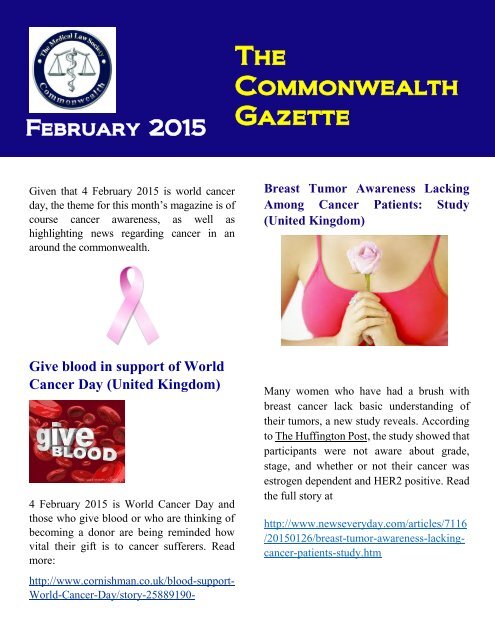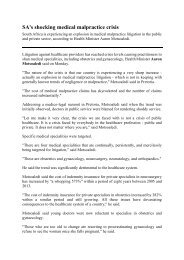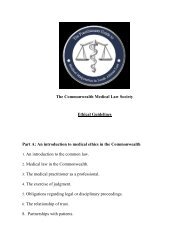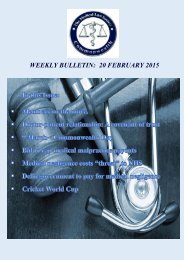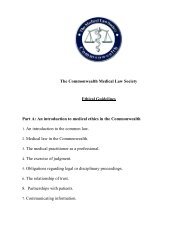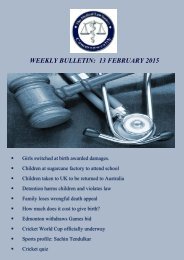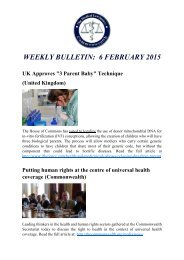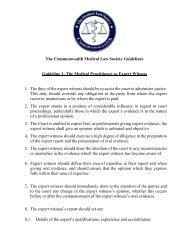The Commonwealth Gazette
You also want an ePaper? Increase the reach of your titles
YUMPU automatically turns print PDFs into web optimized ePapers that Google loves.
February 2015<br />
<strong>The</strong><br />
<strong>Commonwealth</strong><br />
<strong>Gazette</strong><br />
detail/story.html#ixzz3Q1tlcIln<br />
Given that 4 February 2015 is world cancer<br />
day, the theme for this month’s magazine is of<br />
course cancer awareness, as well as<br />
highlighting news regarding cancer in an<br />
around the commonwealth.<br />
Breast Tumor Awareness Lacking<br />
Among Cancer Patients: Study<br />
(United Kingdom)<br />
Give blood in support of World<br />
Cancer Day (United Kingdom)<br />
4 February 2015 is World Cancer Day and<br />
those who give blood or who are thinking of<br />
becoming a donor are being reminded how<br />
vital their gift is to cancer sufferers. Read<br />
more:<br />
http://www.cornishman.co.uk/blood-support-<br />
World-Cancer-Day/story-25889190-<br />
Many women who have had a brush with<br />
breast cancer lack basic understanding of<br />
their tumors, a new study reveals. According<br />
to <strong>The</strong> Huffington Post, the study showed that<br />
participants were not aware about grade,<br />
stage, and whether or not their cancer was<br />
estrogen dependent and HER2 positive. Read<br />
the full story at<br />
http://www.newseveryday.com/articles/7116<br />
/20150126/breast-tumor-awareness-lackingcancer-patients-study.htm
Heartburn 'possible cancer sign' warning<br />
(United Kingdom)<br />
Blood for sale: India's illegal 'red market'<br />
(India)<br />
A health campaign is urging people not to<br />
ignore heartburn, because it could be a sign of<br />
stomach or oesophageal cancer. According to<br />
Public Health England, people should go to<br />
their doctor if they have persistent heartburn<br />
or difficulty swallowing food for three weeks<br />
or more. Read the full story at<br />
http://www.bbc.com/news/health-30953825<br />
Former Nigerian Goalkeeper dies of<br />
cancer (Nigeria)<br />
Wilfried Agbonavbare Ex-Nigerian<br />
goalkeeper who had had a protracted battle<br />
with cancer has died. <strong>The</strong> Tunisia 1994<br />
Nations Cup winning second choice keeper<br />
reportedly died of cancer in Spain on<br />
Tuesday, January 27, 2015. His wife died<br />
years ago, also from cancer. He lives behind<br />
young children. Read storyat<br />
http://odili.net/news/source/2015/jan/27/510.<br />
html<br />
Blood is in chronic short supply in India,<br />
according to the World Health Organization<br />
(WHO), which stipulates that every country<br />
needs at least a 1% reserve. India, with its<br />
population of 1.2 billion people, needs 12<br />
million units of blood annually but collects<br />
only 9 million - a 25% deficit. Read the full<br />
story at http://www.bbc.com/news/business-<br />
30273994<br />
Botswana Doctor Is Named to Lead<br />
W.H.O. in Africa (Botswana)<br />
A defining moment in the life of Dr.<br />
Matshidiso Moeti, the World Health<br />
Organization’s new regional director for<br />
Africa, came when she was 9 and her father<br />
realized that her little sister’s mathematics<br />
textbook was below even the level he had<br />
studied as a poor child on a South African<br />
farm. He and his wife had both graduated from<br />
one of the country’s top medical schools, the<br />
University of the Witwatersrand, but the<br />
National Party that came to power in 1948 had<br />
imposed “Bantu education” on blacks,<br />
preparing them only for subservient jobs under<br />
apartheid. Read the full story at<br />
http://www.nytimes.com/2015/01/28/world/af<br />
rica/botswana-doctor-is-named-to-lead-whoinafrica.htmlhpw&rref=health&action=click&
Egypt FGM trial 'convicts doctor of<br />
manslaughter' (Egypt)<br />
patients' group Healthwatch England. In this<br />
week's Scrubbing Up, she says the NHS often<br />
doesn't let witnesses file complaints - an<br />
omission akin to preventing people reporting<br />
an abandoned bag at an airport because they<br />
don't have the owner's permission. Read the<br />
full story at<br />
http://www.bbc.com/news/health-30333071<br />
Medical Guild extends strike<br />
ultimatum (Nigeria)<br />
An Egyptian doctor has been convicted of the<br />
manslaughter of a girl who died after an<br />
illegal female genital mutilation procedure,<br />
activists say. Opponents of FGM were<br />
dismayed when Raslan Fadl was acquitted in<br />
November of charges relating to the death of<br />
13-year-old Suhair al-Bataa. But after an<br />
appeal, a court in the Nile Delta city of<br />
Mansoura sentenced him to more than two<br />
years in prison.<strong>The</strong> campaign group Equality<br />
Now called the ruling a "monumental<br />
victory". Read the full story at<br />
pgtype=Homepage&module=wellregion®ion=bottomwell&WT.nav=bottom-well&_r=0<br />
http://www.bbc.com/news/world-middleeast-30983027.<br />
NHS should welcome 'citizen<br />
whistleblowers' (United Kingdom)<br />
People who see something going wrong in the<br />
NHS should be able to report their concerns,<br />
even if they haven't been directly affected,<br />
according to Anna Bradley, the chair of<br />
Doctors employed by the Lagos State<br />
Government have extended the 21-day strike<br />
ultimatum given to the state government over<br />
the non-payment of their July and August<br />
salaries. It would be recalled that the Medical<br />
Guild gave a 21-day ultimatum to the state<br />
government to resolve certain issues or face<br />
industrial action. <strong>The</strong> ultimatum lapsed on<br />
Sunday, January 18, 2015. Read more at<br />
http://www.punchng.com/health/medicalguild-extends-strike-ultimatum/
'Half of UK people' will get cancer.<br />
(United Kingdom)<br />
One in two people in the UK will be<br />
diagnosed with cancer at some point in their<br />
lives, analysis suggests. Cancer Research UK<br />
said this estimate, using a new calculation<br />
method, replaced a forecast of more than one<br />
in three people developing the disease. It said<br />
longer life expectancies meant more people<br />
would be affected. But it was not inevitable<br />
and improving lifestyle, such as losing weight<br />
and quitting smoking, could have a major<br />
impact, the charity added.<strong>The</strong> good news is<br />
cancer survival figures are also rising. Read<br />
the full story at<br />
http://www.bbc.com/news/health-31096218<br />
Britain and <strong>Commonwealth</strong> may<br />
suspend Guyana for breaching rules<br />
(Guyana)<br />
<strong>The</strong> 53-nation <strong>Commonwealth</strong> grouping of<br />
former British colonies last week threatened<br />
to sanction Guyana’s government for its<br />
suspension of the country’s parliament and<br />
for its steadfast refusal to hold local<br />
government elections for more than 20 years,<br />
Britain’s representative to the country said<br />
this week. Read the full story at<br />
http://newpittsburghcourieronline.com/2015/<br />
01/22/britain-and-commonwealth-maysuspend-guyana-for-breaching-rules/.<br />
Measles outbreak: <strong>The</strong> loopholes in<br />
Canada's vaccination laws. (Canada)<br />
Publicly funded immunization programs<br />
continue to be stricken by lower-thanrecommended<br />
rates of uptake among some<br />
Canadian populations, despite potentially<br />
saving hundreds of thousands of young lives<br />
a year. In Toronto, public health officials<br />
worry that four confirmed cases of measles —<br />
two children and two adults — could be just<br />
the beginning of a larger outbreak,<br />
particularly given the warnings by the U.S.<br />
Centers for Disease Control of a flare-up that<br />
has afflicted 102 people in 14 U.S. states.<br />
Racism against aboriginal people in<br />
health-care system 'pervasive': study<br />
(Canada)<br />
A new study suggests racism against<br />
aboriginal people in the health-care system is<br />
"pervasive" and a major factor in substandard<br />
health among native people in Canada. <strong>The</strong><br />
study — called First Peoples, Second Class<br />
Treatment — was released today by the<br />
Wellesley Institute, which researches public<br />
health issues. Read the full article at<br />
http://www.cbc.ca/news/aboriginal/racismagainst-aboriginal-people-in-health-caresystem-pervasive-study-1.2942644
Robert Downey Jr. is interested in<br />
Detective Byomkesh Bakshy (India)<br />
his hit number 'Chaiyya chaiyya' some day.<br />
Obama, who was in India on a three-day state<br />
visit, recollected that when he had first visited<br />
India in 2010, he had experienced some<br />
'bhangra'. Read the full story at<br />
http://timesofindia.indiatimes.com/entertain<br />
ment/hindi/bollywood/news/Shah-Rukh-<br />
Khan-to-Obama-Next-time-Chaiyya-<br />
Chaiyya/articleshow/46030988.cms<br />
Robert Downey Jr. has played Sherlock<br />
Holmes in the American film series which is<br />
one of the biggest detective franchises. Time<br />
and again, Detective Byomkesh Bakshy! is<br />
getting pitted against Sherlock Holmes and<br />
when Robert heard about this Indian<br />
detective, it piqued his interest. A source<br />
shares, Detective Byomkesh Bakshy! is an<br />
iconic detective character among Indians.<br />
However with a film being modeled around<br />
it, people across borders are getting to know<br />
about him. As a genre it holds the attention<br />
across the globe and especially after the trailer<br />
the film Detective Byomkesh Bakshy! has<br />
intrigued audiences at large."<br />
Read the full story at<br />
http://timesofindia.indiatimes.com/entertain<br />
ment/hindi/bollywood/news/Robert-<br />
Downey-Jr-is-interested-in-Detective-<br />
Byomkesh-<br />
Bakshy/articleshow/46029659.cms<br />
South African U20's clinch the<br />
<strong>Commonwealth</strong> Cup in Russia (South<br />
Africa)<br />
<strong>The</strong> South Africa men's U20 national team,<br />
the Amajita, made history in Russia when<br />
they beat Finland with 2-1 in the final of the<br />
<strong>Commonwealth</strong> Cup at the weekend. Read<br />
the full story at<br />
http://www.timeslive.co.za/sport/soccer/201<br />
5/01/26/south-african-u20-s-clinch-thecommonwealth-cup-in-russia<br />
Shah Rukh Khan to Obama: Next<br />
time 'Chaiyya Chaiyya' (India)<br />
Bollywood superstar Shah Rukh Khan is<br />
delighted that US President Barack Obama<br />
incorporated his famous 'Senorita' dialogue<br />
during an address in the national capital. Now<br />
King Khan hopes that Obama will groove to
CASE DISCUSSION<br />
Unreported Judgments<br />
<strong>The</strong> following (as yet) unreported judgments<br />
which are of interest were recently delivered in<br />
the <strong>Commonwealth</strong>.<br />
In the South African Constitutional Court: H v<br />
Fetal Assessment Centre Case CCT<br />
74/14 [2014] ZACC 34). <strong>The</strong> Constitutionality of<br />
the so-called “wrongful life” action was<br />
considered. <strong>The</strong> case is internationally<br />
significant because the Court did not uphold an<br />
exception that the cause of action is not valid –<br />
and in doing so, the judgment is one of the few<br />
instances of such a right being potentially<br />
countenanced by the courts.<br />
In the United Kingdom Supreme Court:<br />
Greater Glasgow Health Board<br />
(Appellant) v Doogan and another<br />
(Respondents) (Scotland) [2014]<br />
UKSC 68: <strong>The</strong> Abortion Act 1967 (as amended)<br />
sets out the circumstances in which the<br />
termination of a pregnancy can lawfully be<br />
brought about. Section 4(1) establishes a right of<br />
conscientious objection: it provides that ‘no<br />
person shall be under any duty, whether by<br />
contract or by any statutory or other legal<br />
requirement, to participate in any treatment<br />
authorised by this Act to which he has a<br />
conscientious objection’ unless, pursuant to<br />
subsection (2), it is ‘necessary to save the life or<br />
prevent grave permanent injury to the physical<br />
or mental health of a pregnant woman’. This<br />
appeal dealt with the precise scope of the right to<br />
conscientious objection.<br />
In the South African Supreme Court of Appeal:<br />
Cecilia Goliath v Member of the<br />
Executive Council for Health,<br />
Eastern Cape (085/2014) [2014] ZASCA<br />
182. In this “swab case”, the court considered the<br />
maxim res ipsa loquitur in the context of actions<br />
for medical negligence. <strong>The</strong> court held that it was<br />
inappropriate to resort to a piecemeal processes<br />
of reasoning. <strong>The</strong>re was only one enquiry -<br />
whether the plaintiff has discharged the onus of<br />
proving on a balance of probabilities the<br />
negligence averred against the defendant.<br />
Reported Judgments<br />
Birmingham Children's NHS Trust<br />
v B and another [2014] EWHC 531<br />
(Fam); 137 BMLR 222.<br />
A week-old baby with transposition of the great<br />
arteries required cardiac surgery – he had no<br />
prospects of long-term survival without surgery.<br />
<strong>The</strong> baby’s parents, who were Jehovah’s<br />
Witnesses, were willing to consent to surgery but<br />
not to necessary blood on religious grounds. <strong>The</strong><br />
hospital sought a declaration from court that it<br />
would be lawful to perform cardiac surgery and<br />
to deploy blood during and consequent to that<br />
surgery. <strong>The</strong> parents did not actively oppose the<br />
hospital's application.<br />
In considering this application, the judge<br />
considered, in its widest possible sense, the<br />
baby's welfare best interests. It was clear on the<br />
evidence that, while risks attached to him<br />
undergoing the procedure, those were minimal<br />
risks, whereas if the baby did not undergo the<br />
procedure, his chances of survival were<br />
extremely poor. Looking at his welfare best<br />
interests, there was no doubt that it was in his<br />
best interests to undergo the surgery that was<br />
proposed. Because it was inevitable that he must<br />
receive blood transfusions during the course of,<br />
or subsequent to, the surgery the judge<br />
determined, notwithstanding the parents'<br />
understandable objections on religious grounds,<br />
that it was in the baby's welfare best interests to<br />
receive blood products both during the surgery<br />
and, if necessary, subsequent to it.
Mental Health Trust and others v<br />
DD (by her litigation friend, the<br />
Official Solicitor) and another<br />
[2014] EWCOP 11; 140 BMLR 118.<br />
This case dealt with the determination of a<br />
person’s best interests who is mentally incapable<br />
of making legally valid decisions.<br />
A mother of five was pregnant with her sixth<br />
child. Four of the five children had been<br />
adopted, and the fifth was in care. <strong>The</strong> patient<br />
had a complex obstetric history, learning<br />
difficulties and autistic spectrum disorder, and<br />
was accordingly a vulnerable person. <strong>The</strong><br />
hospital sought court orders concerning the<br />
health of mother during final stage of pregnancy,<br />
and the safe delivery of the unborn baby, as well<br />
as an order authorising assessment of mother's<br />
capacity to make decisions about contraception<br />
following the birth of baby. <strong>The</strong> issues were<br />
whether the patient had capacity to litigate on<br />
the relevant issues, whether the declarations<br />
sought were in the patient’s best interests, and<br />
whether the patient lacked capacity to consent to<br />
an assessment of her capacity to make decisions<br />
in relation to contraception. <strong>The</strong> applicants<br />
proposed that the patient should not be advised<br />
of the date planned for the caesarean procedure,<br />
but that they should be given partial<br />
information.<br />
<strong>The</strong> Court held, on the facts, that the patient<br />
lacked the capacity to litigate in relation to the<br />
relevant issues. She lacked capacity to make<br />
decisions in respect of her healthcare, in<br />
particular to decide where to give birth to her<br />
unborn child and to decide whether to have her<br />
baby delivered by vaginal delivery or caesarean<br />
section. It was in her best interests, and<br />
therefore lawful for her to be taken to a hospital<br />
and for the medical, nursing and midwifery<br />
practitioners attending her to carry out a<br />
planned caesarean section and all necessary<br />
ancillary care; and to provide the patient with all<br />
necessary ancillary pre-operative care and<br />
treatment. <strong>The</strong> applicants were authorised to<br />
take such necessary, reasonable and<br />
proportionate measures to give effect to the best<br />
interests declaration, including forced entry into<br />
the patient’s home, restraint to prevent her from<br />
leaving the ward pending treatment and/or until<br />
it was clinically appropriate for her to be<br />
discharged, and any necessary sedation. <strong>The</strong><br />
judge required the applicants to take all<br />
reasonable steps to minimise distress to the<br />
patient and to maintain her dignity, and<br />
concluded that there were reasonable grounds to<br />
believe that the patient lacked capacity to<br />
consent to an assessment of her capacity to make<br />
decisions in relation to contraception. However,<br />
it was not considered to be in the patient's best<br />
interests, or that she should be subject to a oneday<br />
assessment of her capacity to make<br />
decisions about contraception at this stage, and<br />
that application was refused. That issue would<br />
need to be addressed as a matter of urgency<br />
within two months or so after the birth.<br />
(Consideration was given to arts 6 and 8 of the<br />
European Convention for the Protection of<br />
Human Rights and Fundamental Freedoms<br />
1950. Human rights – Mental Capacity Act 2005<br />
– European Convention for the Protection of<br />
Human Rights and Fundamental Freedoms<br />
1950, arts 5 and 8).<br />
R v H 140 BMLR 59; [2014] EWCA Crim<br />
1555.<br />
This is a case dealing with the use of expert<br />
evidence, and the undesirability of leading<br />
unreliable or inappropriate expert evidence. <strong>The</strong><br />
case follows a trend in a number of jurisdictions<br />
in which expert evidence has come under<br />
increasing scrutiny by the courts (see eg. United<br />
Kingdom: Jones v Kaney - 119 BMLR 167 [2011]<br />
UKSC 13; Ndlovu v Road Accident Fund 2014<br />
(1) SA 415 (GSJ)).<br />
<strong>The</strong> applicant was a general practitioner who<br />
had been convicted of various offences. <strong>The</strong> trial<br />
judge had refused to admit evidence of an expert<br />
which was in the appellant’s favour, and the<br />
applicant appealed. <strong>The</strong> appeal against<br />
conviction was dismissed. <strong>The</strong> court found that<br />
the trial judge had not erred in refusing to admit<br />
the evidence of the expert. <strong>The</strong> defence was<br />
entitled in appropriate cases to call expert<br />
evidence on a specific subject outside the
knowledge and experience of the jury which<br />
might assist them in the task of assessing<br />
credibility and reliability. However, in the<br />
instant case, the trial judge had found that there<br />
was no evidence on which the jury could find<br />
that the complainant had 'recovered' or<br />
'retrieved' memories during the treatment for<br />
her mental illness, and there was thus no basis<br />
for admitting the expert’s evidence of false<br />
memory syndrome, which would have had the<br />
effect of usurping the function of the jury in<br />
assessing the complainant's credibility as a<br />
witness.<br />
parties and the court if the expert’s opinion<br />
changes from that contained in a report served<br />
as evidence or given in a statement).<br />
(Editor’s note: Of importance, the court (per<br />
curiam) expressed a real concern about the use<br />
of unreliable or inappropriate expert evidence in<br />
such cases. In the United Kingdom, the Criminal<br />
Procedure Rules 2014 and amendments to the<br />
Criminal Practice Directions made by the Lord<br />
Chief Justice came into force which incorporated<br />
certain reliability factors recommended by the<br />
Law Commission for the admission of expert<br />
evidence. When these changes occurred, a new<br />
and more rigorous approach on the part of the<br />
courts to the handling of expert witnesses was<br />
adopted. <strong>The</strong> intention was to avoid<br />
misunderstandings about what was (and what<br />
was not) appropriately included in an expert's<br />
report and so either avoid, or at least render far<br />
more straightforward, submissions on<br />
admissibility such as those made in the instant<br />
case. In particular, comment based only on<br />
analysis of the evidence which effectively<br />
usurped the task of the jury was to be avoided.<br />
Part 33 of the Rules now includes an<br />
identification of the expert’s duty to the court as<br />
being: to help the court to achieve the overriding<br />
objective that criminal cases be dealt with justly<br />
by giving opinion which is objective and<br />
unbiased and within the expert’s area or areas of<br />
expertise. This duty overrides any obligation to<br />
the person from whom the expert receives<br />
instructions or by whom the expert is paid. <strong>The</strong><br />
duty includes obligations to define the expert’s<br />
area or areas of expertise in the expert’s report,<br />
and when giving evidence in person. When<br />
giving evidence in person, the expert is obliged<br />
to draw the court’s attention to any question to<br />
which the answer would be outside the expert’s<br />
area or areas of expertise; and to inform all


